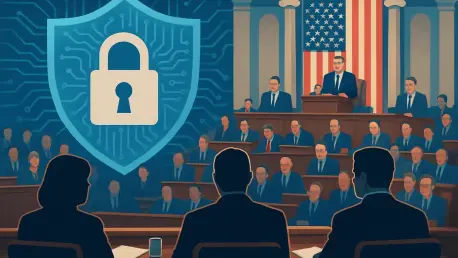In an era where cyber threats loom larger than ever, the urgency to safeguard national digital infrastructure has taken center stage in congressional debates, with a pivotal piece of legislation at the heart of the discussion. The Cybersecurity Information Sharing Act (CISA) of 2015, designed to facilitate the exchange of cyber threat intelligence between private companies and federal agencies under legal protections, faces a critical juncture. After a temporary lapse during a government shutdown earlier this year, a short-term funding bill revived the act until January 30. Yet, with its long-term future hanging in the balance, a bipartisan coalition in the Senate is rallying to secure a decade-long extension, emphasizing the indispensable role of public-private collaboration in combating escalating digital dangers. This effort underscores a shared recognition that sustained mechanisms for sharing cyber intelligence are vital to national security, setting the stage for a complex legislative battle amid competing priorities and ideological concerns.
Senate Coalition Drives for Long-Term Stability
The push for extending CISA for a full decade is spearheaded by Senators Gary Peters (D-Mich.) and Mike Rounds (R-S.D.), who have introduced the Protecting America from Cyber Threats Act to anchor this critical legislation through the next ten years, from now until 2035. Their proposal, unveiled at the Aspen Cyber Summit in Washington, D.C., has garnered significant bipartisan traction, with Rounds estimating potential support ranging from 60 to 90 votes in the Senate—a supermajority that signals widespread acknowledgment of the law’s importance. This act fosters a crucial partnership between private industry and government entities like the FBI and NSA, offering legal safeguards against lawsuits or penalties for sharing sensitive data. Such protections have proven essential in encouraging companies to disclose cyber threat information without fear of repercussions, thereby strengthening collective defenses against sophisticated attacks that target critical infrastructure and personal data.
Beyond the promising support, the senators are navigating a strategic path to ensure the bill’s passage by embedding it within a larger spending or appropriations package, recognizing that a standalone vote is unlikely to succeed in the crowded legislative agenda. This approach reflects a pragmatic understanding of Senate dynamics, where bundling related measures often accelerates progress. Peters and Rounds remain optimistic, highlighting that the temporary revival of CISA after the shutdown demonstrates its recognized value across party lines. However, the looming expiration in late January adds a layer of urgency, as failure to act could disrupt the flow of vital intelligence-sharing at a time when cyber threats—from ransomware to state-sponsored hacking—are growing in frequency and complexity. The focus now lies on building momentum to secure the extension before the deadline, ensuring long-term stability for a framework that has become a cornerstone of national cybersecurity strategy.
Challenges and Opposition in the Legislative Arena
Despite the broad bipartisan backing, a significant obstacle emerges in the form of Senator Rand Paul (R-Ky.), chairman of the Senate Homeland Security Committee, whose reservations about CISA center on concerns over government overreach. Paul has voiced unease about the Cybersecurity and Infrastructure Security Agency’s role in monitoring online speech, viewing it as a potential infringement on civil liberties. His counterproposal advocates for a mere two-year extension and the elimination of key legal incentives that encourage private companies to share data—an alteration that Rounds warns could undermine the law’s effectiveness and jeopardize its passage. This dissent introduces a critical tension between the urgent need for robust cybersecurity measures and the protection of individual privacy, a debate that continues to shape legislative priorities in the digital age.
Navigating Paul’s opposition requires strategic maneuvering, with Peters and Rounds exploring options like a cloture vote to bypass objections, though this process demands a 60-vote margin and could delay progress by weeks. The complexity of Senate procedures further complicates the timeline, as Rounds notes that even under optimal conditions, moving a bundled package through Congress typically takes at least two weeks. This time-sensitive effort is compounded by the risk of another lapse if the temporary extension expires without a permanent solution. The rebranding of the extension bill as the Protecting America from Cyber Threats Act also aims to clarify its intent and distinguish it from the federal agency of the same acronym, refocusing the narrative on safeguarding national interests. As negotiations unfold, the outcome hinges on balancing these ideological differences with the pressing need for sustained cyber defense mechanisms.
Strategic Pathways and Future Implications
Looking ahead, the strategy to integrate the CISA extension into a broader legislative package offers the most viable route to success, reflecting a calculated effort to overcome standalone challenges in a polarized Congress. This approach not only leverages the momentum of related funding measures but also mitigates the risk of the bill stalling amid competing priorities. The bipartisan consensus among most senators underscores a shared commitment to reinforcing cybersecurity frameworks, particularly as digital threats evolve with alarming sophistication. Yet, the nuanced opposition from figures like Paul highlights the delicate balance between security imperatives and personal freedoms, a tension that will likely continue to influence policy discussions beyond this specific legislation. The potential for a supermajority vote remains a hopeful indicator, suggesting that compromise and collaboration could pave the way for a decade of stability in cyber intelligence sharing.
Reflecting on past efforts, the temporary revival of the act after its brief lapse during the shutdown served as a stark reminder of its critical role in national defense, galvanizing support across party lines. As the January deadline approaches, senators are working tirelessly to build coalitions and refine their legislative tactics, ensuring that the importance of public-private partnerships is not overshadowed by procedural hurdles. The historical context of these efforts reveals a growing recognition of cybersecurity as a nonpartisan issue, with each step forward driven by the collective resolve to protect against digital vulnerabilities. Moving into the future, the focus must shift toward not only securing this extension but also addressing emerging threats through innovative policies and sustained dialogue, ensuring that the framework for sharing cyber intelligence remains robust and adaptable for years to come.









